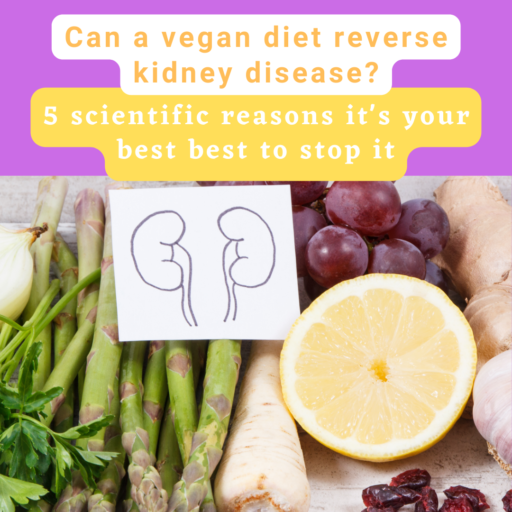Chronic kidney disease (CKD) is one of the top ten causes of premature mortality in the U.S., and it’s on the rise. The vast majority of people – 96% – with mild to moderate impairments in kidney function go undiagnosed. Even people with severely impaired kidney function go undiagnosed 48% of the time. Kidney disease causes reduced quality of life for patients and caregivers and is a costly public health issue. If you or a loved one has kidney disease, you might have wondered, “Can a vegan diet reverse kidney disease?” Unfortunately, no, but the good news is this: it’s possible to prevent, slow and halt the progression of kidney disease through healthy lifestyle changes.
- Can a vegan diet reverse kidney disease?
- Risk factors and comorbidities
- 1. Animal-based foods promote chronic kidney disease
- 2. A whole-foods plant-based vegan diet can prevent, slow and halt kidney disease
- 3. These vegan foods are especially potent in fighting kidney disease and its comorbidities
- 4. Status quo medical interventions to treat kidney disease have drawbacks
- 5. Concerns about phosphorus and protein intake on a plant-based diet are antiquated and unsupported by the literature
- Whole foods plant-based vegan diets should be recommended to prevent and treat kidney disease
Can a vegan diet reverse kidney disease?
While the site Forks Over Knives claims that a vegan diet can reverse kidney disease, this uncited claim does not appear to be supported by research. According to the CDC and UK NHS, it’s not possible to repair or reverse damage that has already happened to your kidneys, but you can slow it down and keep it from getting worse.
Beyond taking prescribed medication and being physically active, eating a healthful diet is a huge step you can take to slow and halt its progression. Doing so is essential because your kidneys are essential to keep you alive. Kidneys that can’t filter blood well enough can lead to comorbidities like heart disease and stroke.
Risk factors and comorbidities
Risk factors and common comorbidities include type 2 diabetes, high blood pressure, cardiovascular disease, obesity, metabolic acidosis, metabolic syndrome and a family history of chronic kidney disease. Since the early stages of disease don’t cause symptoms, testing is recommended for those who have any of these risk factors.
Many people with chronic kidney disease are able to live long lives without being significantly impacted by the condition. If your condition is mild or moderate, it’s essential to stop it from getting worse to reduce your risk of other health problems. By adopting a whole-foods plant-based vegan diet as part of a healthy lifestyle, you can optimize your quality of life and possibly prevent the need for dialysis or kidney transplant.
1. Animal-based foods promote chronic kidney disease

Animal-based protein promotes an acidic environment, inflammation and overworks the kidneys. The typical Western diet promotes metabolic acidosis (a high acid load) through heavy intake of animal-based foods. Protein, saturated fat and cholesterol from animal products all increase microalbuminuria and proteinuria, which are signs of reduced kidney function.
Animal-based protein temporarily overworks the kidneys through hyperfiltration. Regular intake of animal protein over years stresses the kidneys, causing a decline in kidney function. In particular, red and processed meat is associated with increased risk of kidney disease, as well as speeding up its progression in those already with the disease.
2. A whole-foods plant-based vegan diet can prevent, slow and halt kidney disease

A whole-foods plant-based diet is very much like a vegan diet. It also eliminates all or most animal products and also excludes highly processed foods, such as oils, sugars and bleached flours.
Evidence is mounting that a whole foods plant-based (WFPB) vegan diet helps slow the progression of chronic kidney disease and prevent end-stage renal disease. One of the mechanisms by which it helps is by reducing rates of diabetes and obesity, as well as reducing inflammation and cholesterol. These factors help prevent kidney failure and delay or prevent the need for dialysis or kidney transplant.
A WFPB dietary pattern is typically 7-15% fat, 75-80% unprocessed or minimally processed carbohydrates, and 10-15% protein. It focuses on whole grains, seeds, nuts, legumes, fruits, vegetables, tubers and starchy vegetables. Furthermore, the drugs typically prescribed to treat kidney disease have negative side effects and fail to address comorbidities.
High fiber + plant protein = lower blood pressure, less metabolic acidosis, and less stress on kidneys

WFPB diets address diabetes because they are high in fiber, which promote glycemic control. The high fiber content also helps promote a healthy weight, as fiber helps people to feel fuller for longer.
The low protein aspect reduces uric acid buildup and metabolic acidosis and can help slow the progression of kidney disease. Plant-based protein is anti-inflammatory, contains properties that protect the kidneys, and can produce alkaline. They come packaged with fiber, phytonutrients and antioxidants. As a result, plant-based protein promotes decreased blood pressure.
The fiber found only in plants results in gut microbiota producing more anti-inflammatory compounds and fewer uremic toxins. The low acid load of plant-based diets mitigates metabolic acidosis in patients with kidney disease and could help slow its progression.
3. These vegan foods are especially potent in fighting kidney disease and its comorbidities

In particular, cruciferous vegetables like broccoli sprouts, broccoli, brussels sprouts, cabbages, cauliflower, and kale have been found especially effective as a nutritional intervention in kidney disease. High consumption of cruciferous vegetables may be associated with fewer kidney failure events. These types of vegetables provide a natural source of sulforaphane, which may reduce inflammation and oxidative stress.
They also alter the composition of gut microbiota to support a healthy gut. This is important, as people with kidney disease have a gut microbiota imbalance that leads to high levels of uremic toxins, changes in the gut barrier, local and systemic inflammation and oxidative stress. This leads to cell injury and death, DNA damage and more inflammation, and increased risk of kidney disease progression.
Several studies have shown that compounds like curcumin (found in turmeric), prebiotics (found in foods like garlic, onions and chickpeas) and Brazil nuts can serve as a beneficial intervention for people with kidney disease.
Plant-based omega-3 fatty acids help reduce cardiovascular disease, comorbid diseases and all-cause mortality in patients with kidney disease. These fatty acids are found in foods like flaxseeds, chia seeds, olives, walnuts, broccoli, brussels sprouts and soybeans.
Reducing inflammation is also key to addressing kidney disease and its comorbidities. While saturated fat promotes inflammation, plant foods like cherries, whole grains, and soy have been shown to decrease inflammation, acid load and morality. In general, anti-inflammatory foods may be helpful in reducing CKD.
Metabolic acidosis is a common concern for patients with kidney disease. Because plant-based foods put a lower stress on kidneys through a lower acid load, they can slow kidney disease progression and prevent metabolic acidosis. Even seven days on a plant-based vegan diet has been shown to improve acidity and lower dietary cholesterol.
Several experimental and clinical studies suggest that probiotics may also help reduce uremic acid load, lessen inflammation and delay the progression of renal dysfunction. However, data is currently inconclusive and requires more research to determine if using both prebiotics and probiotics may improve prove beneficial.
4. Status quo medical interventions to treat kidney disease have drawbacks

At present, the first medical line of defense to treat CKD is to prescribe a multitude of drugs and a “renal diet” that focuses on macro and micronutrient content of individual foods.
While the principal medical intervention to reduce cholesterol in patients with kidney disease is to prescribe medications like statins, dietary change offers a more cost effective and sustainable method to reduce cholesterol levels.
The renal diet has proven ineffective in preventing the comorbidities. Additionally, these diets often lead patients to reduce intake of healthful foods to prevent overeating a particular nutrient, such as potassium.
A more effective approach is to focus on a dietary pattern that improves overall health in kidney disease patients, including treating comorbid diseases. As comorbid diseases like cardiovascular disease are leading causes of mortality in patients with kidney disease, they are equally important to address.
5. Concerns about phosphorus and protein intake on a plant-based diet are antiquated and unsupported by the literature

Some medical professionals have expressed concern with increased plant intake. They fear that patients, especially those with late stage kidney disease, will consume too much of contraindicated minerals, especially potassium, phosphorus and sodium. Having high potassium levels can lead to an irregular heartbeat and put patients at greater risk for a cardiac event.
As it turns out, while plant foods have more of these minerals, it’s harder for our bodies to absorb them from plants than from animal foods. In other words, there is typically less bioavailability of potassium in plant-based foods than animal-based or heavily processed foods.
Furthermore, the potassium in produce comes alongside bicarbonate, which causes more potassium to be excreted in the urine. Studies have demonstrated that increased fruit and vegetable intake does not cause overabundance of potassium in patients with kidney disease. However, the specific effect of a WFPB diet on late-stage chronic kidney disease still requires more research. The one supplement required on a WFPB diet is vitamin B12. Despite concerns about mineral deficiency of plant-based diets, studies have indicated sufficient micronutrient levels on plant-based diets.
Some nephrology and nutrition professionals persist in recommending animal-based protein, despite the fact that these antiquated concerns with amino acid deficiencies of plant-based proteins were debunked years ago.
Plant-based proteins provide sufficient protein of sufficient “quality.” The largest study of those eating plant-based diets (over 96,000 participants) found that vegans exceeded their minimum requirement for protein. Unfortunately, consumption of animal-based proteins in patients with kidney disease may worsen blood pressure, metabolic acidosis, and hyperphosphatemia. In contrast, substituting plant-based proteins for animal-based proteins has been shown to reduce hypertension, hyperphosphatemia and metabolic acidosis.
Whole foods plant-based vegan diets should be recommended to prevent and treat kidney disease

Higher adherence to a healthy plant-based diet and a vegetarian diet is associated with a lower risk of developing kidney disease. Overall, plant-based diets have few risks and many benefits for the prevention and treatment of kidney disease, as they improve metabolic acidosis and dangerous comorbidities like high blood pressure, high cholesterol, cardiovascular disease, obesity, and diabetes.
Whole-foods plant-based vegan diets treat the root cause of disease rather than covering it up with medications. Concerns about overconsumption of phosphorus and protein inadequacy are unsupported by current literature. While a vegan diet cannot reverse kidney disease, it can slow and even halt its progression to protect your quality of life. Research indicates that whole foods plant-based diets should be recommended both to prevent and treat kidney disease.


